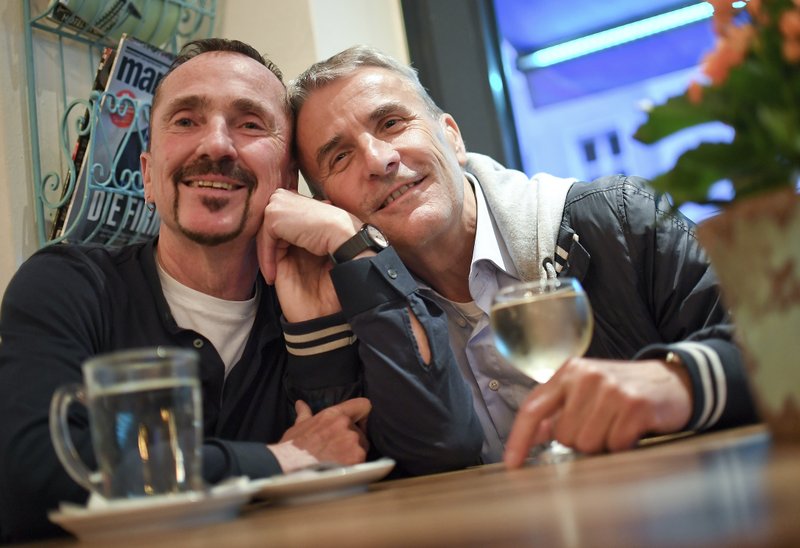‘Ja’ at last: 1st same-sex couples in Germany to wed Sunday
BERLIN: Almost 40 years after their first kiss, Karl and Bodo are getting hitched.
The two civil servants from Berlin are expected to become the first gay couple to tie the knot in Germany when a law allowing same-sex marriages takes effect Sunday.
Until now, gay and lesbian couples in Germany only were able to enter into registered partnerships that gave them fewer legal rights than married heterosexual couples.
“This is an emotional moment with great symbolism,” Karl Kreile said as his wedding day approached. “The transition to the term ‘marriage’ shows that the German state recognizes us as real equals.”
Kriele, 59, and his partner, Bodo Mende, 60, have been at the forefront of campaigning for gay rights in Germany since meeting in 1979 in what was then West Berlin. The city at that time was a magnet for people seeking to escape the political and social constraints on both sides of a divided Germany.
Kreile recalled the “shame” he felt in 1992, amid a new spirit of optimism three years after the fall of the Berlin Wall, when he and Mende marched into a registry office and asked to be married, only to be politely turned away.
The couple registered their partnership 10 years later, after Germany became one of the first countries worldwide to allow civil unions. But as other countries began legalizing same-sex marriages, Germany fell behind, in part due to Chancellor Angela Merkel’s opposition.
Merkel, who has been chancellor for 12 years, agreed to let parliament hold a free vote on same-sex marriages in June, three months before a national election. She voted against the move herself, but a majority of lawmakers backed the measure, making Germany the 14th country in Europe and the 23rd worldwide to allow same-sex couples to marry.
Mende thinks the result might have been different if the vote were held now, given the rightward shift in German politics after the Sept. 24 election. The upstart Alternative for Germany party, which won seats in parliament for the first time, campaigned mainly against immigration and Islam, but its platform also opposes full equality for same-sex couples even though one of its leaders, Alice Weidel, is openly lesbian.
“I regard them as political enemies,” Kreile said. He cited recent crackdowns on lesbians and gay men in Poland, Russia and Turkey as evidence that LGBT rights can’t be taken for granted anywhere.
Joerg Steinert, who heads the Berlin branch of Germany’s lesbian and gay association, LSVD, said being able to marry will have tangible benefits for same-sex couples, including the right to adopt children. The first such adoption is expected to take place in Berlin on Oct. 4, he said.
Steinert said the change also will take a load off Germany’s famously complex bureaucracy, by removing hundreds of special exceptions — in areas ranging from university loans to hunting regulations — that were put in place over the years as same-sex couples successfully challenged discrimination in the courts.
A few hurdles remain, however. The computer system used to record marriages in Germany currently requires one partner to be registered as the man, the other as the woman. Kreile and Mende haven’t made up their minds who will be which, and officials say the fields can’t be changed even after the system is upgraded next year.
Such problems won’t spoil the party on Sunday, said Steinert, “but it’s embarrassing for the German government.”
Some local authorities in Germany have enthusiastically embraced the prospect of same-sex marriages, even deciding to open their registry offices on a Sunday to conduct and celebrate the first gay and lesbian weddings.
Among them are the northern city of Hamburg and the Berlin district of Schoeneberg, which has been the center of gay life in the German capital for more than a century.






